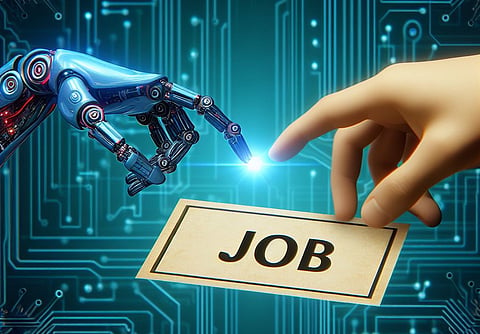

Moving away from its earlier stance that AI is ‘not leading to job losses’, Government of India seems to be coming round to the realization that AI may end up taking jobs away from some people.
“AI may result in automating some routine jobs but will also result in job creation in various data science, data curation etc,” said Electronics and Information Technology Minister Rajiv Chandrasekar.
This is in contrast to the minister’s stance in July last year. At the time, the minister had dismissed all talk of AI taking away jobs in India as “nonsense, bakwas”.
He had also said that the “advent of Artificial Intelligence is not leading to any job losses,” and that it is only being "used as a tool for augmenting capability."
New Roles
In his new statement, the minister seemed to hint that these job-losses can be offset by the new ones created by this technological revolution.
But "this will require reskilling and upskilling,” he said.
He said his ministry has initiated “FutureSkills PRIME” program giving training in 10 new and emerging technologies, including artificial intelligence.
The program has trained 2.9 lakh youth out of the 16.52 lakh who have signed up, he added. In addition, 2,258 trainers and 10,986 government officials have been trained on these technologies, he added..
He also pointed to another program -- YUVAi: Youth for Unnati and Vikas with AI -- for familiarizing school students from classes 8th to 12th with AI tech and social skills. It explores the application of AI in eight areas - agriculture, health, education, transportation, environment, rural development, smart cities and law and justice.
New Industrial Revolution
Meanwhile, experts believe that the rise of AI is likely to lead to massive unemployment among white-collar workers, such as those who work in finance, law, medicine and technology. In its scale and pain, it is expected to be similar to what was faced by blue-collar workers (artisans) during the time of the first industrial revolution 300 years ago.
The jobs most likely to see declines are ones that involve highly repeatable tasks and pattern recognition and those that involve analyzing or processing large volumes of structured data.
Algorithms are increasingly able to handle jobs that involve gathering data, processing paperwork, tracking inventories, or interacting with customers.
As a result, they can affect jobs such as data entry clerks, administrative assistants and secretaries, accountants & bookkeepers, financial analysts, manufacturing & warehouse workers, retail salespeople, customer service representatives and drivers.
Even some blue-collar jobs, such as driving, sales and warehouse management, are also under threat as a combination of advanced robotics and AI enable machines to do physical tasks that they were not able to earlier.
The disruption will favor people who are better able to adapt to changes.
For example, a customer service rep may have their more routine tasks automated, but transition into more complex complaint and dispute resolution that requires human judgement. Similarly, a financial analyst may spend less time crunching numbers in excel and more time interpreting data patterns identified algorithmically.
As for the new jobs that are emerging, they often require very different skill sets compared to those possessed by people who are facing job losses. Among the roles in high demand are AI and robotics engineers, data analysts and automation specialists.